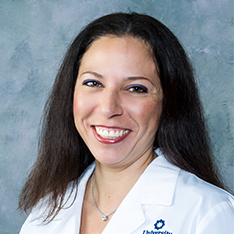When an elderly loved one’s memory starts to slip, what is actually happening in their brains may not be immediately apparent. It could be dementia; it might be the early signs of Alzheimer’s; it could be vascular dementia – or it might be caused by something else entirely.
“Dementia is really an overall term for advancing age with loss of memory and thoughts and the ability to learn new things,” said Dr. Katherine Whiteley, a University Health family medicine physician. “There’s actually lots of different kinds of dementia.”
But the first thing a physician should do is rule out about a hundred other possibilities, she said.
“It’s always a good idea to see the doctor because we always look at all the other things first,” Dr. Whiteley said. “We’re going to look at medications, often sleep medications – including over-the-counter medications like antihistamines.”
Other causes for what may appear to be dementia include:
- Anemia
- Hypothyroidism
- Liver problems
- Kidney problems
- Alcohol and drug use
- Sleep disorders such as sleep apnea
- Depression
High blood pressure over time can also contribute to decreased brain function, Dr. Whiteley said, but it’s less easily dealt with because it causes vascular dementia that can’t be reversed.
“Vascular dementia is permanent. We modify their risk factors so that it does not progress,” she said. “The body needs blood flow to the brain. The less blood flow the less it works.”
Dr. Andres Pardo, a University Health geriatrician, said he’s often approached by family members of his older patients about possible dementia.
“Kids may say, ‘My mom and dad are more forgetful. When I talk to them, they don’t even remember what I told them,’ or, ‘My mom keeps asking the same question over and over.’”
When it’s dementia and not some other issue, Dr. Pardo said the majority of older patients are developing Alzheimer’s, followed by vascular dementia, Lewy body dementia, frontotemporal dementia and normal pressure hydrocephalus.
Alzheimer’s normally starts to show around age 75 or 80 with memory issues, he said. “Early-onset can show in a person’s 50s or 60s, but that’s pretty rare, and there’s usually a genetic component.”
Preventing Dementia
Prevention is a matter of lowering risk factors.
“If you feel like you are at risk for early dementia, the common advice is make sure you eat healthy and exercise. Getting regular exercise decreases plaque around your arteries,” Dr. Pardo said. “Studies have shown that people that exercise and eat healthy preserve their brain function a little longer. Also, take a look at alcohol consumption and tobacco use. The things that affect your health overall can affect your memory.”
Treatment for dementia
Treatment is mostly limited to managing symptoms, the doctors said. Some medications can help, but a lot of the work involves schedules.
“The thing for the family to do is to keep the patient on a schedule,” Dr. Whiteley said. She recommends regular bedtime and rising times, careful attention to hygiene, keeping a calendar and clock nearby at all times and having the patients watch the news to stay up on current events. And it’s very important that they socialize.
“The less interaction they have, the worse they do,” Dr. Whiteley said. “Isolation leads to depression and no brain stimulation.”
Along with the calendar and clock she recommends keeping a detailed emergency phone list nearby in case the patient runs into trouble because they can’t be expected to remember a lot of names and numbers.
Families and caregivers should check on patients with dementia and make sure they have fresh food available, as well as monitoring their eyesight and hearing – two important ways they interact with the world and keep further cognitive decline at bay.
“If they can’t see things and read small print the dementia gets worse and they lose that sense,” she said. “They stop reading because they can’t see the print; they stop watching TV because they can’t see the screen. It’s one big loop.”
Resources for dementia patients and their caregivers
The bulk of the responsibility falls heavily on the shoulders of family members, Dr. Whiteley said, because specialized nursing facilities are expensive.
They can learn more about the disease at Alzheimers.org.
If a patient qualifies, she advises family members to look into Medicare Advantage, which will cover home health care, home safety assessments and medical equipment that aren't covered by Medicare. “What’s also important is that it can cover services that give the caregivers breaks,” she added.
“The patients need a lot of supervision,” often 24 hours a day, which can be exhausting and creates the conditions that can lead to elder abuse. “That’s when abuse comes into play – too much time and too much burden,” Dr. Whiteley said.




